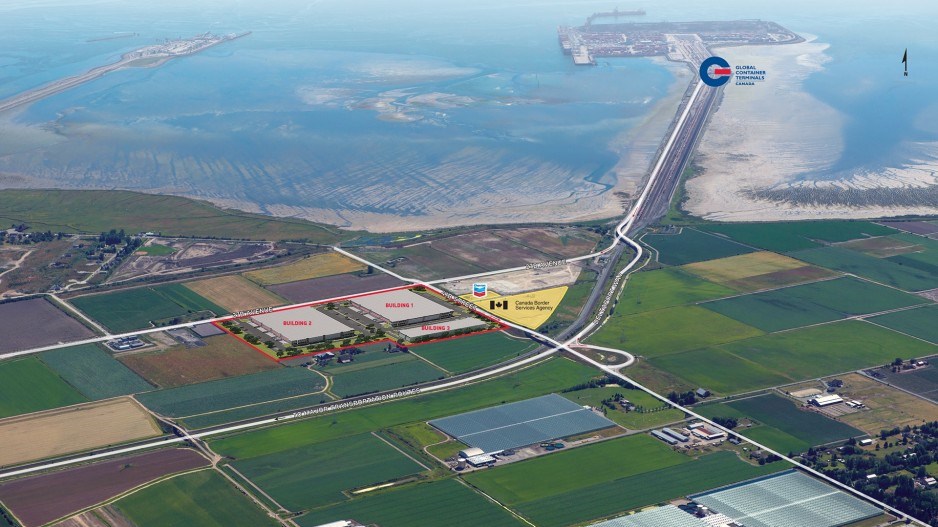Add container shipping to the Tsawwassen First Nation’s inventory of businesses.
The first phase of the its three-phase Delta iPort container logistics centre is being built on a 57-acre portion of a 300-acre Tsawwassen First Nation industrial development site adjacent to the Port of Vancouver’s Deltaport.
The $130 million development spearheaded by TFN Economic Development Corp. (TFNEDC), the band’s land development arm, is aimed at expanding containerized cargo distribution capacity in a region where industrial land suitable for goods movement and other Asia Pacific Gateway trade activities is increasingly constrained.
Lead developer on the project is GWL Realty Advisors Inc. The Toronto-based company develops, owns and manages a diverse portfolio of industrial, retail, commercial and residential real estate projects, but it’s developing Delta iPort as a speculative venture on behalf of Healthcare of Ontario Pension Plan (HOOPP).
The institutional investor is not normally given to involvement in speculative leasehold port/shipping ventures. But the long-term prospects for Delta iPort and transpacific containerized cargo convinced HOOPP to step outside its investment comfort zone, said Geoff Heu, GWL’s vice-president of development, Western Canada.
“A lot of private guys do this type of stuff, but there are not a lot of long-term patient institutional owners that are doing it. HOOOP, along with us, we’re one of the few.”
Heu said the distribution centre’s proximity to port operations, its physical size and operational flexibility coupled with the region’s limited availability of usable port-related industrial land justified building Delta iPort on speculation rather than waiting for major pre-lease tenants.
“We are confident that there are enough large-scale tenants looking for a product like this … that it will get leased up very quickly, so we’re not going to wait for a pre-lease tenant.”
A new CBRE Vancouver report has noted that Vancouver, at 2.7%, now has North America’s lowest industrial real estate availability rate. That number, which is below 2008’s previous record low of 3.6%, puts the city on course to run out of industrial land 10 years earlier than previously projected, CBRE estimates.
The Tsawwassen First Nation’s site is five kilometres from the South Fraser Perimeter Road, just over 27 kilometres from Vancouver International Airport and around 35 kilometres from the Canada-U.S border.
Because it’s on First Nations land, Delta iPort is subject to a long-term lease. Once the pre-paid 60-year lease expires, Delta iPort will revert to the band, which could take over ownership and management of the facility or extend the lease.
Delta iPort’s 453,000-square-foot first phase is scheduled to be completed by May 2018. A similar-sized second phase and a slightly smaller third phase are scheduled to follow. The entire project is scheduled to be completed by 2020.
Delta iPort is part of an industrial development that includes container examination and transloading facilities and a sewage treatment plant that will accommodate the 10 million square feet of industrial, commercial and residential development planned for TFN land.
The band is banking on the ambitious development to provide more than a foundation for its current and future economy and property tax base. It’s part of the TFN’s plan to chart long-term career and business paths for its members.
“We have changed the conversation down here from not just talking about jobs to really building careers … and our development partners have all been very supportive of that,” said Chris Hartman, TFNEDC’s CEO.
“At the end of the day, you are going to have a community where you can live, work shop and play all within walking distance; it’s a master plan complete community that really is going to become a major employment centre not only within the Lower Mainland but in the province because the sort of activity we are seeing here could create somewhere in the range of 8,000 to 10,000 full-time equivalent jobs.”
The Port of Vancouver’s (PoV) transpacific containerized cargo is expected to continue to grow. It handled more than 25 million tonnes of containerized goods in 2016.
While numbers released at the Vancouver Fraser Port Authority’s May 30 annual general meeting showed annual port revenue down 1.7% to $235 million compared with fiscal 2015, the global economy is expected to improve in 2017.
The World Trade Organization has pegged 2017 world trade to grow between 1.8% and 3.1%.
Strong growth in container volumes at key international ports in 2017’s first quarter recently prompted shipping data company Alphaliner to revise full-year global container throughput growth to 4.6% from earlier projections of between 2% and 3%.
Vancouver is forecasting its overall cargo to increase 1% this year and annual cargo growth to average 4% over the next five years.
@timothyrenshaw




